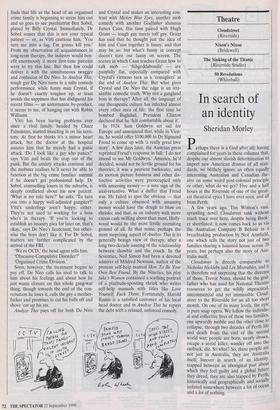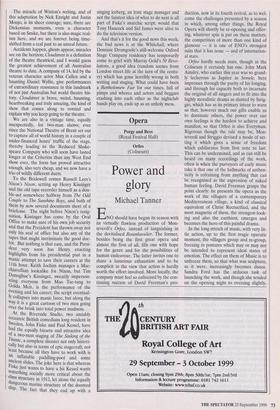Theatre
Cloudstreet (Riverside) Nixon's Nixon (Bridewell) The Sinking of the Titanic (Riverside Studio) 50 Revolutions (Whitehall)
In search of an identity
Sheridan Morley
Perhaps there is a God after all; having complained for years in these columns that, despite our almost slavish determination to import new American dramas of all stan- dards, we blithely ignore an often equally interesting Australian and Canadian the- atre on some weird post-colonial principle or other, what do we get? Five and a half hours at the Riverside of one of the great- est theatrical epics I have ever seen, and all from Perth.
A few years ago, Tim Winton's vast, sprawling novel Cloudstreet sank without much trace over here, despite being Book- er shortlisted; it now comes back to us via the Australian Company B Belvoir in a breathtaking production by Neil Armfield, one which tells the story not just of two families sharing a haunted house across 20 years, but perhaps also the story of Aus- tralia itself.
Cloudstreet is directly comparable to Nicholas Nickleby and Les Miserables, and it is therefore not surprising that the director of those, Trevor Nunn, should be the god- father who has used his National Theatre resources to get the wildly impractical, uncommercial and yet unmissable Cloud- street to the Riverside for an all too short month. On one of its many levels, the epic is pure soap opera. We follow the individu- al and collective lives of these two families, one upwardly mobile and the other close to collapse, through two decades of Perth life and death from the end of the second world war; people are born, nearly drown, escape a serial killer, wander off into the outback, die. So what? So, these people are not just in Australia, they are Australia itself; forever in search of an identity, trapped between an aboriginal past about which they feel guilty and a global future they dread, they are also trapped by Perth, historically and geographically and socially isolated somewhere between a lot of ocean and a lot of nothing. The miracle of Winton's writing, and of this adaptation by Nick Enright and Justin Monjo, is its sheer courage; sure, there are Dickensian moments, even a character based on Smike, but there is also magic real- ism here, and we are forever being time- shifted from a real past to an unreal future.
Accidents happen, ghosts appear, miracles are on the horizon; Cloudstreet is a definition of the theatre theatrical, and I would guess the greatest achievement of all Australian theatre to date. A company of 14, led by the veteran character actor Max Cullen and a haunting Daniel Wyllie, give performances of extraordinary resonance in this landmark of not just Australian but world theatre his- tory. Cloudstreet is brave, weird, haunting, heartbreaking and truly amazing, the kind of show that comes along to remind and explain why you keep going to the theatre.
We are also in a vintage time, equally unexpectedly, for two-man shows; ever since the National Theatre of Brent set out to capture all of world history in a couple of under-financed hours' traffic of the stage, thereby leading to the Reduced Shake- speare Company who will soon have lasted longer at the Criterion than any West End show ever, the form has proved attractive enough, also very cheap, and we now have a trio of wildly different duets.
To the Bridewell comes Russell Lees's Nixon's Nixon, setting up Henry Kissinger and the old tape-recorder himself as a dou- ble-act somewhere halfway from The Odd Couple to The Sunshine Boys, and both of them by now several documents short of a briefcase. The night before Nixon's resig- nation, Kissinger has come by the Oval Office to make sure of his own job security and that the President has thrown away not only his seal of office but also any of the tapes that might incriminate the good doc- tor. But nothing is that easy, and the Presi- dent very soon has Henry enacting highlights from his presidential past in a manic attempt to save their careers at the 11th hour. Keith Jochim manages a Mac- chiavellian lookalike for Nixon, but Tim Donoghue's Kissinger, sweatily imperson- ating everyone from Mao Tse-tung to Golda Meir, is the performance of the evening and his career; the script eventual- ly collapses into manic farce, but along the way it is a great cartoon of two men going over the brink into total power madness. At the Riverside Studio, two amiably eccentric British comedians long resident in Sweden, John Fiske and Paul Kessel, have had the equally bizarre and attractive idea of a two-man staging of The Sinking of the Titanic, a complete disaster not only histori- cally but also in terms of epic stagecraft, not least because all they have to work with is an inflatable paddling-pool and some ancient slides. The joke here is that whereas Fiske just wants to have a hit Kessel wants something socially more critical about the class structure in 1912, let alone the equally dangerous marine structure of the doomed ship• The fact that they end up with a singing iceberg, an irate stage manager and not the faintest idea of what to do next is all part of Fiske's anarchic script; would that Tony Hancock and Sid James were alive to do the television version.
And that's it for the good news this week; the bad news is at the Whitehall, where Dominic Dromgoole's still-welcome Oxford Stage Company residency has temporarily come to grief with Murray Gold's 50 Revo- lutions, a good idea (random scenes from London street life at the turn of the centu- ry) which has gone horribly wrong in both writing and staging. What could have been a Bartholomew Fair for our times, full of pimps and whores and actors and beggars crashing into each other as the nightclub bands play on, ends up as an unholy mess.



























































































 Previous page
Previous page